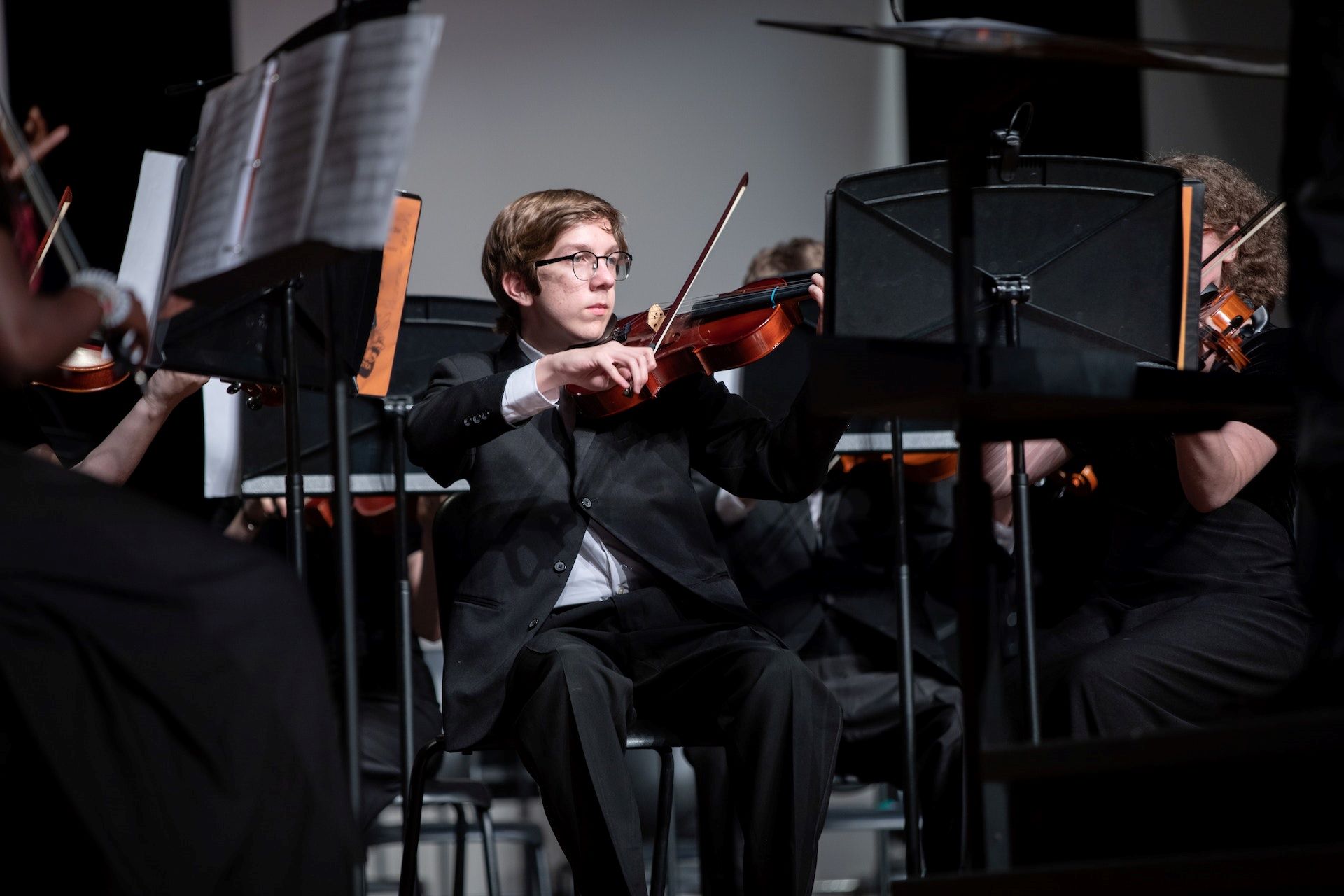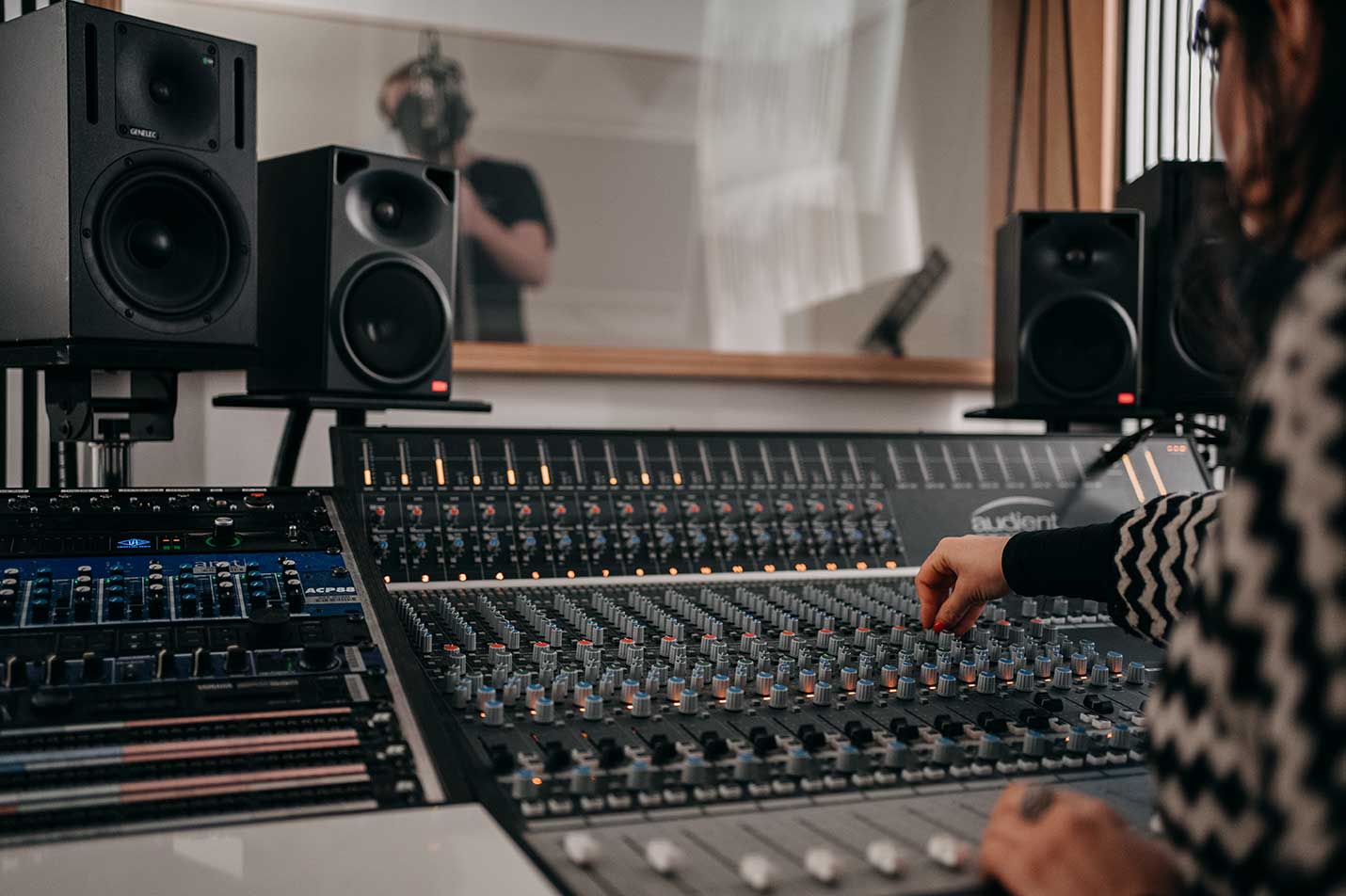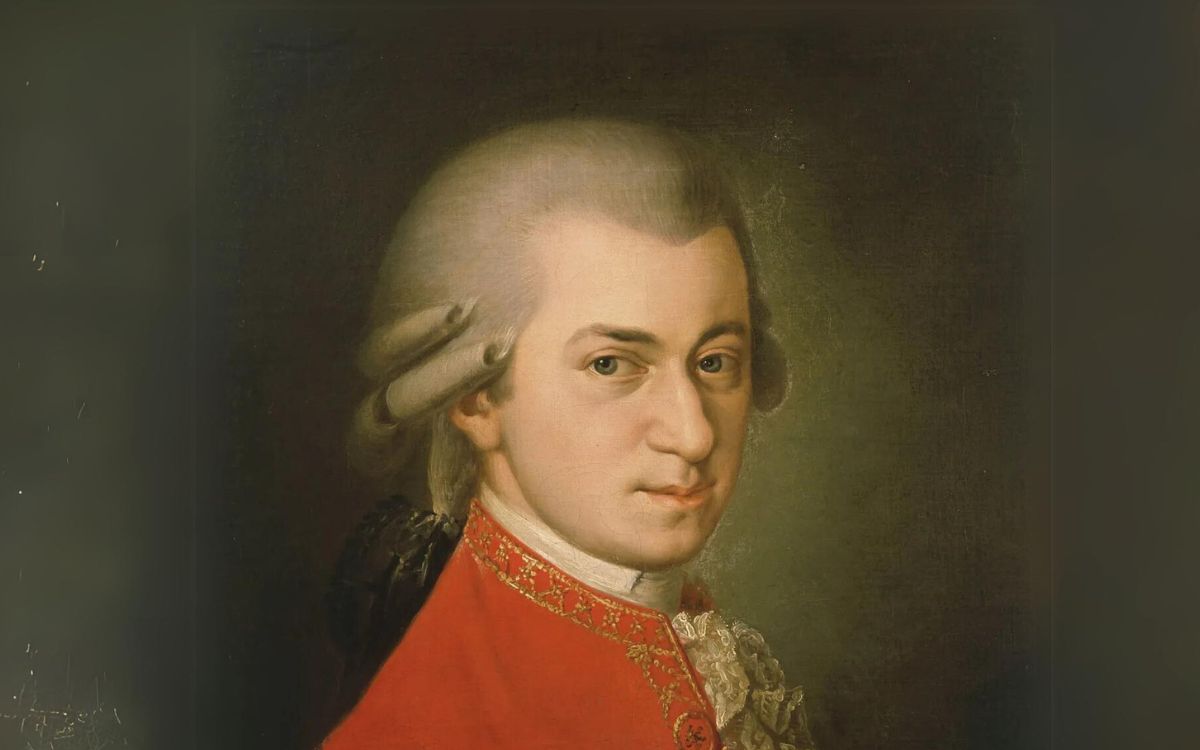Home>Production & Technology>Composer>How Did Hans Zimmer Become A Composer


Composer
How Did Hans Zimmer Become A Composer
Published: December 6, 2023
Discover the incredible journey of Hans Zimmer, from his humble beginnings to becoming a renowned composer. Dive into the world of music and witness the transformation of a musician into a composer.
(Many of the links in this article redirect to a specific reviewed product. Your purchase of these products through affiliate links helps to generate commission for AudioLover.com, at no extra cost. Learn more)
Table of Contents
Introduction
Hans Zimmer is a legendary composer, known for his exceptional talent in creating mesmerizing music for films. With a career spanning several decades, Zimmer has composed scores for numerous blockbuster movies, earning critical acclaim and capturing the hearts of audiences worldwide. His unique approach to composition, distinctive sound, and collaborative spirit have established him as one of the most influential figures in the film industry.
Born in Frankfurt, Germany, Zimmer developed a passion for music at a young age. His early exposure to classical music and his experimentation with various instruments laid the foundation for his future success as a composer. Zimmer’s ability to evoke emotions through his compositions is unparalleled, and his work has the power to transport listeners to another world.
As a child, Zimmer’s fascination with sound and music led him to explore different genres and experiment with various instruments. He played in several bands and immersed himself in the world of rock music. This unconventional background gave him a unique perspective when it came to film scoring and allowed him to infuse his compositions with a fresh and innovative sound.
Zimmer’s breakthrough into the world of film scoring came with his collaboration with director Barry Levinson on the critically acclaimed film Rain Man. The success of this collaboration propelled Zimmer into the spotlight, leading to numerous opportunities to work with some of the most renowned directors in Hollywood.
One of Zimmer’s greatest strengths lies in his ability to forge deep connections with directors and understand their vision. He approaches each project with a commitment to telling the story through music, and his collaborative nature has resulted in iconic scores that perfectly complement the narrative. His ability to create soundscapes that resonate with audiences and enhance the emotional impact of a film is a testament to his immense talent.
What sets Zimmer apart from other composers is his unique compositional style. He seamlessly blends traditional orchestral elements with contemporary electronic sounds, creating a distinct hybrid sound that has become his signature. He is not afraid to push boundaries and experiment with different musical techniques, leading to groundbreaking compositions that defy categorization.
Early Life and Musical Influences
Hans Zimmer was born on September 12, 1957, in Frankfurt, West Germany. From a young age, he showed a deep interest in music and began playing the piano at the age of four. Zimmer’s parents recognized his musical talent and enrolled him in music lessons, where he quickly excelled.
As Zimmer grew older, he began to explore different genres of music, from classical to rock. He was particularly drawn to the works of composers such as Johann Sebastian Bach and Ludwig van Beethoven, whose compositions inspired him to develop his own unique style.
Zimmer’s exposure to rock music during his formative years also played a significant role in shaping his musical sensibilities. He became enamored with the experimentation and improvisation that characterized the rock genre, and he started playing in bands as a teenager.
During his late teens, Zimmer moved to the United Kingdom to pursue his musical career. He joined a band called Krakatoa, where he played keyboards and collaborated with other talented musicians. This experience allowed him to refine his skills as a musician and explore new soundscapes.
While in the UK, Zimmer also delved into the world of electronic music, which would later influence his unique approach to film scoring. He experimented with synthesizers, drum machines, and other electronic instruments, gaining a deep understanding of their capabilities and nuances.
In 1980, Zimmer caught the attention of film director and producer Stanley Myers, who offered him the opportunity to work on the score for the film “My Beautiful Laundrette.” This marked Zimmer’s entry into the world of film scoring, where he would eventually make his mark as a pioneering composer.
Zimmer’s early experiences and musical influences shaped his artistic vision and set the stage for his future success. His ability to draw from a diverse range of musical genres and blend them seamlessly into his compositions has been a hallmark of his career.
Throughout his life, Zimmer has continued to explore new musical territories and challenge traditional conventions. His relentless pursuit of innovation and dedication to pushing the boundaries of film scoring have solidified his position as one of the most influential composers in the industry.
Journey into Film Scoring
After his entry into film scoring with “My Beautiful Laundrette,” Hans Zimmer quickly made a name for himself in the industry. His distinct musical style caught the attention of directors and producers who were drawn to his innovative approach to composition. As a result, Zimmer began receiving more opportunities to work on a variety of film projects in the coming years.
Zimmer’s breakthrough came in 1988 with his collaboration with director Barry Levinson on the film “Rain Man.” The score he created for the film resonated with audiences and critics alike, earning him widespread recognition. Zimmer’s ability to capture the emotions and complexities of the characters through his music showcased his exceptional talent and paved the way for future success.
One of Zimmer’s defining moments as a film composer came in 1994 when he worked on the score for “The Lion King.” Collaborating with lyricist Tim Rice and composer Elton John, Zimmer created an iconic soundtrack that became an integral part of the film’s success. The emotional depth and cultural resonance of the music made it a worldwide phenomenon, solidifying Zimmer’s status as a master composer.
Throughout his career, Zimmer has collaborated with renowned directors, including Christopher Nolan, Ridley Scott, and Ron Howard, among many others. His ability to understand and bring to life the director’s vision through his musical compositions has made him a trusted and sought-after collaborator in the industry.
Zimmer’s contributions to film scoring go beyond traditional orchestration. He pioneered the use of electronic and synthesizer-driven sounds in his compositions, breaking away from traditional scoring techniques. His experimentation with innovative sound design has consistently pushed the boundaries of what can be achieved in film music.
The establishment of his own music production company, Remote Control Productions, allowed Zimmer to mentor and collaborate with a new generation of composers, fostering a creative environment that fuels the evolution of film scoring.
Over the years, Zimmer’s work has earned him numerous accolades, including Academy Awards, Golden Globe Awards, and Grammy Awards. His scores have become synonymous with the films they accompany, enriching the cinematic experience and resonating with audiences on a profound level.
Through his remarkable journey into film scoring, Hans Zimmer has not only revolutionized the industry but has also left an indelible mark on the art of storytelling through music. His ability to evoke emotions and create unforgettable melodies has made him a true master of his craft, inspiring generations of composers to follow in his footsteps.
Collaboration with Directors
Hans Zimmer’s success as a film composer can be attributed in large part to his deep and collaborative relationships with directors. Throughout his career, he has formed partnerships with some of the most esteemed and influential filmmakers in the industry, resulting in remarkable cinematic experiences.
Zimmer’s collaboration with director Christopher Nolan has been particularly noteworthy. The duo first collaborated on “Batman Begins” in 2005, and their partnership continued on subsequent films such as “The Dark Knight” trilogy, “Inception,” and “Dunkirk.” Zimmer’s scores for these films have become iconic, seamlessly blending with Nolan’s visionary storytelling to elevate the emotional impact of each scene.
Another director with whom Zimmer has shared a fruitful partnership is Ridley Scott. Their collaboration on films such as “Gladiator,” “Black Hawk Down,” and “Hannibal” showcases their ability to create music that enhances the visual narrative, capturing the essence of the story and characters.
One of Zimmer’s longest-standing collaborations has been with director Ron Howard. Together, they have worked on films such as “The Da Vinci Code,” “Angels & Demons,” and “Rush.” Zimmer’s ability to capture the intensity and drama of Howard’s storytelling has made their collaboration a winning formula.
Zimmer’s versatility as a composer is evident in his collaborations with various directors from different genres. He has worked with visionary filmmakers like Terrence Malick on “The Thin Red Line,” Guy Ritchie on “Sherlock Holmes,” and Gore Verbinski on the “Pirates of the Caribbean” franchise. Each collaboration has allowed Zimmer to explore different musical styles and expand his repertoire.
What sets Zimmer apart in his collaborations with directors is his ability to deeply understand the essence of their films and translate it into evocative music. His dedication to storytelling through composition ensures that his scores seamlessly integrate with the director’s vision.
In addition to his work with established directors, Zimmer has also provided mentorship and guidance to emerging filmmakers. He encourages directors to embrace creative risks and push the boundaries of traditional film scoring. This nurturing approach has led to fruitful collaborations with directors like Denis Villeneuve on “Blade Runner 2049” and Jon Favreau on “The Lion King” remake.
Overall, Zimmer’s collaborations with directors have been instrumental in shaping his career and solidifying his position as one of the most accomplished composers in the industry. His ability to understand and elevate a director’s vision through his musical compositions is a testament to his versatility and artistry.
Unique Compositional Style
Hans Zimmer’s compositional style is distinct and instantly recognizable. He has carved out a niche for himself in the film scoring world by seamlessly blending traditional orchestral music with contemporary electronic sounds, creating a unique hybrid sound that sets him apart from other composers.
One of the hallmarks of Zimmer’s style is his ability to create powerful and emotionally evocative melodies. His music has a profound impact on the viewer, capturing the essence of the story and characters. Whether it’s a sweeping orchestral theme or a hauntingly beautiful piano melody, Zimmer’s compositions have a way of resonating deep within the listener’s soul.
Another characteristic of Zimmer’s style is his innovative and experimental use of instruments and sound design. He is not afraid to push the boundaries of traditional scoring techniques, incorporating unconventional instruments and electronic elements into his compositions. This fearless approach to music allows him to create unique sonic landscapes that enhance the storytelling and create a distinct atmosphere in each film.
Zimmer’s use of rhythmic motifs is also a defining aspect of his compositional style. He often employs repetitive patterns and pulsating rhythms to build tension and drive the narrative forward. This rhythmic approach adds a dynamic and energetic dimension to his scores, immersing the audience in the emotions and action of the film.
Furthermore, Zimmer’s music is characterized by its evocative and atmospheric qualities. He has a remarkable ability to create sonic textures that evoke specific moods and settings. Whether it’s the ethereal and mystical tones of “The Lion King” or the dark and brooding atmosphere of “The Dark Knight,” Zimmer’s compositions transport the viewer into the world of the film.
One of the most remarkable aspects of Zimmer’s compositional style is his use of thematic material. He crafts memorable and recurring motifs that are associated with specific characters, events, or concepts within a film. These motifs create a sense of continuity and contribute to the overall storytelling experience. Zimmer’s iconic scores often become inseparable from the films themselves, becoming a crucial part of their identity.
Throughout his career, Zimmer has continued to evolve his compositional style, defying conventions and pushing the boundaries of film scoring. His commitment to innovation and his fearless exploration of new musical territories have established him as a trailblazer in the industry.
Ultimately, Zimmer’s unique compositional style is a testament to his artistry, creativity, and ability to captivate and move audiences through his music. It is this distinctive approach that has solidified his status as one of the most celebrated and influential composers of our time.
Major Film Scores and Awards
Over the course of his illustrious career, Hans Zimmer has composed scores for numerous blockbuster films, earning critical acclaim and industry recognition. His music has resonated with audiences worldwide, enhancing the cinematic experience and leaving a lasting impression.
One of Zimmer’s most iconic film scores is for the 1994 animated masterpiece, “The Lion King.” Collaborating with lyricist Tim Rice and composer Elton John, Zimmer crafted a soundtrack that captured the majestic beauty of the African savannah and the emotional depth of the film’s story. His compositions, including the unforgettable “Circle of Life” and “Can You Feel the Love Tonight,” won him an Academy Award and two Grammy Awards.
Zimmer’s work on Christopher Nolan’s “The Dark Knight” trilogy has become legendary in the world of film scoring. His ominous and haunting score perfectly captured the dark and brooding atmosphere of the films, and his theme for the Joker has become synonymous with the character. For his work on “The Dark Knight,” Zimmer received critical acclaim and won a Grammy Award.
Another notable collaboration between Zimmer and director Christopher Nolan was on the mind-bending science fiction film “Inception.” The score, with its iconic “BRAAM” sound and intricate layers, created an intense and suspenseful atmosphere that became a defining element of the film’s success. Zimmer’s work on “Inception” earned him an Academy Award nomination for Best Original Score.
Zimmer’s talent for capturing the essence of historical events was showcased in his score for Ridley Scott’s “Gladiator.” The epic and sweeping music heightened the emotional intensity of the story and contributed to the film’s overall grandeur. For his work on “Gladiator,” Zimmer received an Academy Award and a Golden Globe Award for Best Original Score.
In addition to these notable film scores, Zimmer has composed music for a wide range of other successful films, including “Pirates of the Caribbean: The Curse of the Black Pearl,” “Sherlock Holmes,” and “Interstellar,” among many others. Each score showcases his versatility and ability to adapt his compositional style to different genres and narratives.
Throughout his career, Zimmer has been honored with numerous awards for his outstanding contributions to film scoring. In addition to his Academy Award wins, he has received multiple nominations for Golden Globe Awards and BAFTA Awards. Zimmer’s impact on the music industry extends far beyond the film realm, as he has also been recognized with accolades for his work on video games, concerts, and other musical projects.
His ability to create music that resonates with audiences, enhances storytelling, and stands the test of time has solidified his status as one of the most influential and respected composers in the industry.
Impact on the Music Industry
Hans Zimmer’s impact on the music industry extends far beyond his success as a film composer. His innovative approach to composition and dedication to pushing the boundaries of sound have had a profound influence on the industry as a whole.
One of Zimmer’s most significant contributions is his ability to seamlessly blend traditional orchestral music with contemporary electronic elements. This fusion of styles has inspired a new generation of composers to experiment with different musical genres and techniques. Zimmer’s sound has become synonymous with epic and emotionally charged scores, influencing the way films are scored and shaping audience expectations.
Zimmer’s use of technology and modern production techniques has also had a transformative impact on the music industry. His pioneering work in incorporating electronic sounds into scores has paved the way for the integration of electronic music in a variety of genres, from pop to classical. Zimmer’s ability to harness the full potential of electronic instruments and software has revolutionized the way music is composed, recorded, and produced.
Furthermore, Zimmer’s collaborative spirit and mentorship have nurtured a new generation of composers. Through his music production company, Remote Control Productions, he has provided a platform for aspiring composers to learn, grow, and develop their own unique voices. This fostering of talent has revitalized the industry, ensuring a continuous influx of fresh and innovative musical perspectives.
His influence is not limited to the film industry either. Zimmer’s work has seeped into popular culture, with his iconic scores becoming instantly recognizable and iconic in their own right. From the thundering drums of “Gladiator” to the dramatic strings of “The Dark Knight,” Zimmer’s music has transcended the screen, permeating the collective consciousness and inspiring a deeper appreciation for film scores.
Moreover, Zimmer’s impact can be felt in the world of live performances and concerts. His music has been adapted for symphony orchestras and performed in concert halls around the world, attracting diverse audiences and bridging the gap between film music and classical compositions. Zimmer’s live performances have reimagined the concert experience, captivating audiences with a visual and auditory extravaganza that brings his film scores to life.
Overall, Hans Zimmer’s relentless pursuit of innovation, willingness to explore new musical territories, and collaborative nature have had a transformative impact on the music industry. His influence is felt not only in films but also in popular culture, technology, and the way compositions are created and experienced. Zimmer’s contributions have elevated the art of film scoring, inspiring composers and leaving an indelible mark on the music world.
Conclusion
Hans Zimmer is a true visionary, whose mastery of composition and innovative approach to music have made him one of the most influential figures in the film industry. His unique blend of traditional orchestral music and contemporary electronic sounds has redefined the boundaries of film scoring, captivating audiences worldwide and leaving an enduring impact on the music industry as a whole.
From his early beginnings as a musician in rock bands to his groundbreaking collaborations with directors, Zimmer’s journey into film scoring has been marked by remarkable achievements. His ability to fully understand a director’s vision and translate it into evocative melodies has made him the go-to composer for many renowned filmmakers.
Zimmer’s compositional style is instantly recognizable, characterized by powerful melodies, experimental sound design, and a seamless fusion of different musical genres. His willingness to push the boundaries of traditional scoring techniques and incorporate technology has revolutionized the way music is composed and produced.
His vast body of work includes iconic scores for films such as “The Lion King,” “The Dark Knight,” and “Gladiator,” each displaying his immense talent for capturing the essence of the story and elevating the cinematic experience. His music has transcended the screen, becoming a part of popular culture and inspiring a new generation of composers.
Beyond his success in film scoring, Zimmer’s impact on the music industry extends to live performances, mentorship, and pushing the boundaries of what is possible in music. The platforms he has created for emerging composers through Remote Control Productions have fostered a sense of creativity and innovation, nurturing the next wave of talent.
In conclusion, Hans Zimmer’s contributions to the world of music and film are immeasurable. His unique compositional style, collaborative spirit, and relentless pursuit of innovation have earned him critical acclaim, awards, and the admiration of audiences worldwide. Zimmer’s impact on the music industry will continue to inspire generations to come, ensuring that his legacy as a pioneering composer will endure for years to come.











